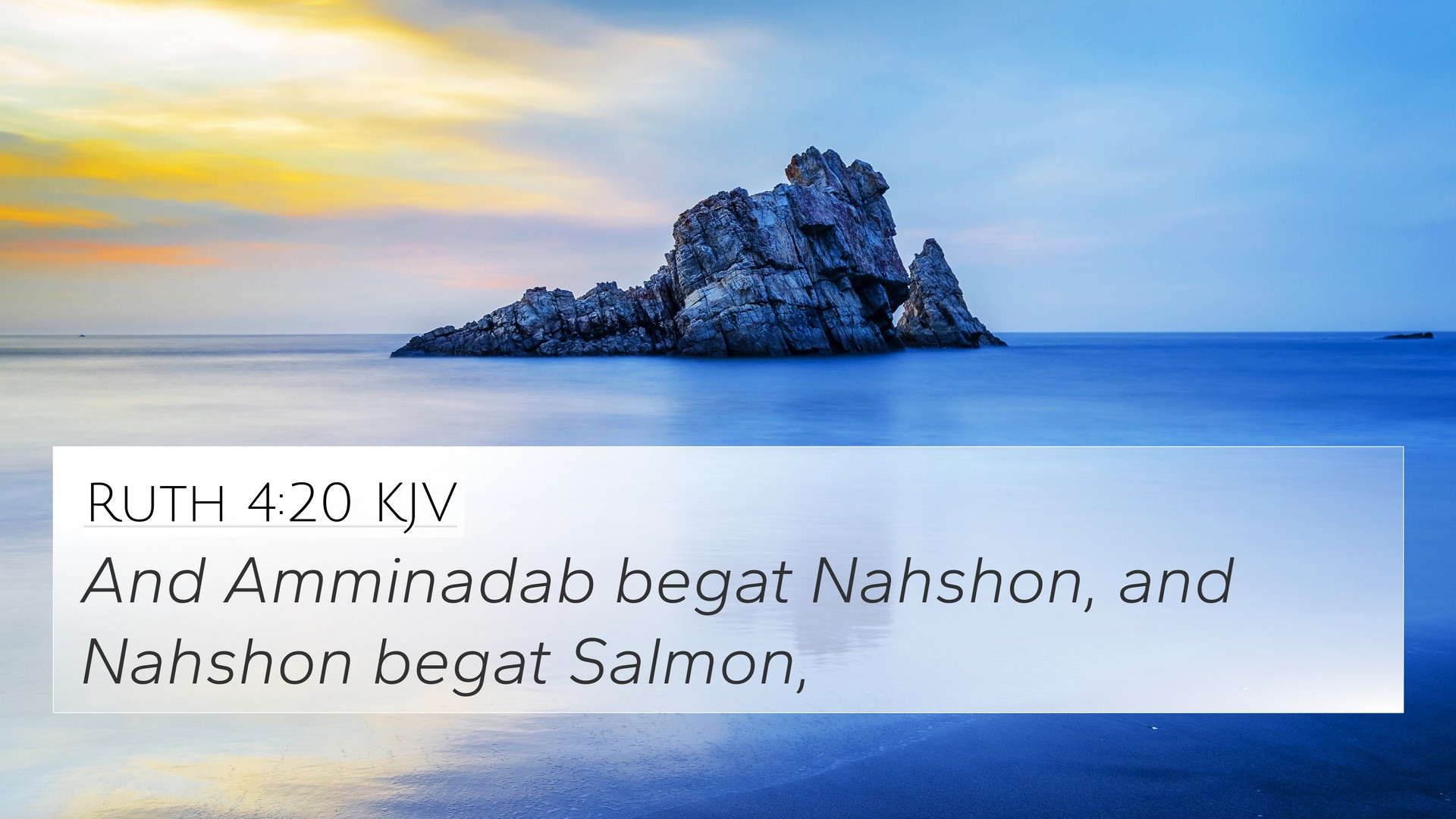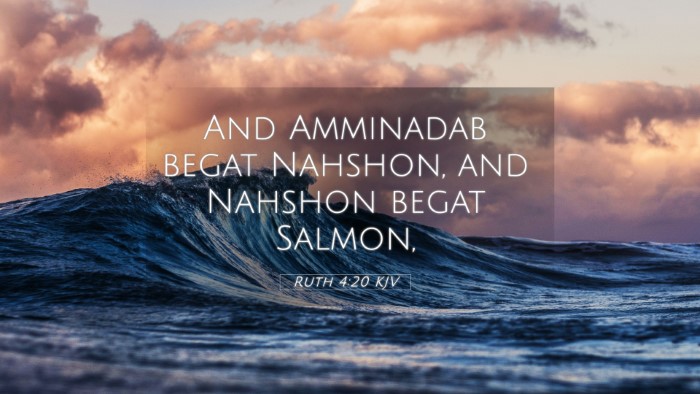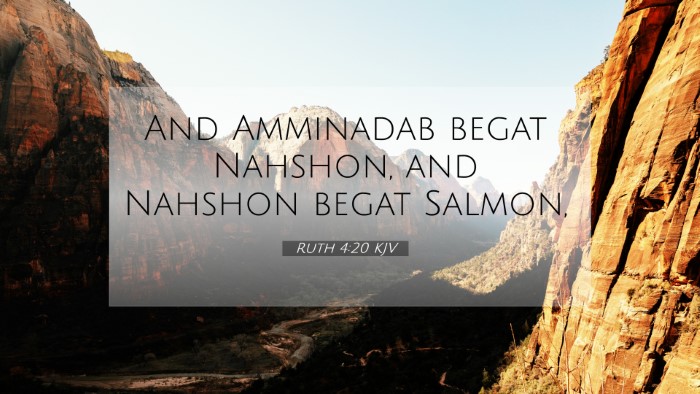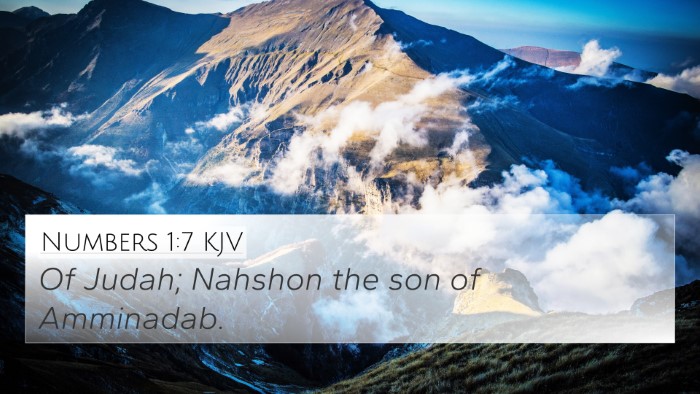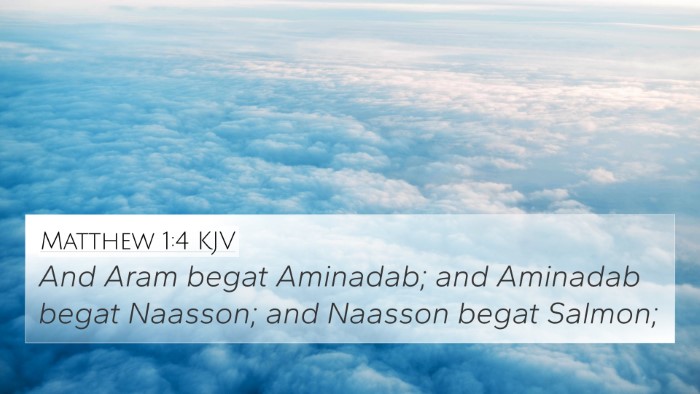Old Testament
Genesis Exodus Leviticus Numbers Deuteronomy Joshua Judges Ruth 1 Samuel 2 Samuel 1 Kings 2 Kings 1 Chronicles 2 Chronicles Ezra Nehemiah Esther Job Psalms Proverbs Ecclesiastes Song of Solomon Isaiah Jeremiah Lamentations Ezekiel Daniel Hosea Joel Amos Obadiah Jonah Micah Nahum Habakkuk Zephaniah Haggai Zechariah MalachiRuth 4:20 Similar Verses
Ruth 4:20 Cross References
And Amminadab begat Nahshon, and Nahshon begat Salmon,
Uncover the Rich Themes and Topics of This Bible Verse
Listed below are the Bible themes associated with Ruth 4:20. We invite you to explore each theme to gain deeper insights into the Scriptures.
Ruth 4:20 Cross Reference Verses
This section features a detailed cross-reference designed to enrich your understanding of the Scriptures. Below, you will find carefully selected verses that echo the themes and teachings related to Ruth 4:20 KJV. Click on any image to explore detailed analyses of related Bible verses and uncover deeper theological insights.
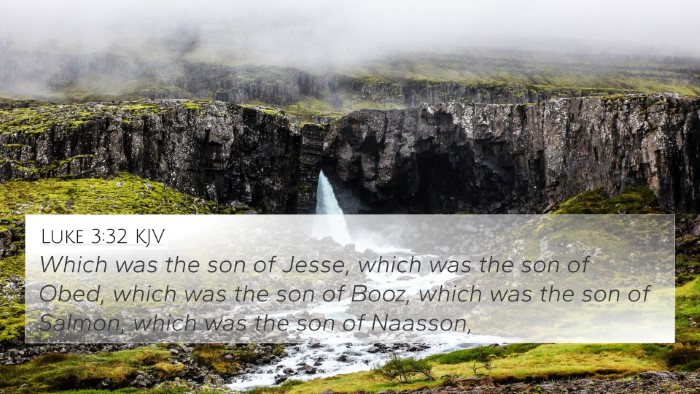
Luke 3:32 (KJV) »
Which was the son of Jesse, which was the son of Obed, which was the son of Booz, which was the son of Salmon, which was the son of Naasson,
Ruth 4:20 Verse Analysis and Similar Verses
Bible Verse Meaning: Ruth 4:20
Ruth 4:20 states: "And Amminadab begat Nahshon, and Nahshon begat Salmon." This verse is a part of the genealogy of David, emphasizing the lineage that leads to Christ and highlighting God's providence in the unfolding story of redemption.
Summary of Insights from Public Domain Commentaries
This verse serves multiple purposes within the larger narrative of the Book of Ruth and the Bible. Key points derived from various commentaries include:
-
Matthew Henry:
Henry emphasizes the importance of genealogies in the Bible, stating that they are not just lists of names but serve to affirm God's faithfulness through generations. The mention of Amminadab, Nahshon, and Salmon underscores the historical truth of God's dealings with His people.
-
Albert Barnes:
Barnes notes that genealogies also function to demonstrate the legitimacy of David’s kingship. By tracing his lineage back to significant figures, the text affirms God's promise to establish David's line forever. This verse also connects to the Messianic prophecy, as it sets the stage for Christ's lineage.
-
Adam Clarke:
Clarke points out that the mention of these names also reflects the social and spiritual implications of family lines in Israelite culture. The genealogy links back to Israel's covenant community, illustrating the faithfulness of God in preserving a remnant throughout the generations.
Bible Cross-References
This verse connects to various other scriptures that enhance understanding through cross-referencing. Below are significant cross-references:
- Genesis 49:10: A prophetic mention of the tribe of Judah, to which David and, ultimately, Jesus belong.
- 1 Chronicles 2:10-12: Detailed genealogy of David’s line, affirming the lineage leading to him.
- Matthew 1:4-5: This account links Ruth's genealogy to the human ancestry of Jesus Christ, illustrating fulfillment of prophecy.
- Hebrews 7:14: Affirms Jesus' lineage from Judah, establishing his priestly role.
- Luke 3:33: A genealogy in the Gospel of Luke that also emphasizes the ancestry of Jesus through David.
- Revelation 5:5: Jesus is referred to as the Lion of the tribe of Judah, connecting him back to the lineage highlighted in Ruth.
- Isaiah 11:1: A reference to a "shoot from the stump of Jesse," affirming the lineage's importance in prophesying the coming Messiah.
Thematic Connections
The genealogy mentioned in Ruth 4:20 presents rich opportunities for thematic analysis:
- Divine Providence: Shows God's hand in human history, guiding the lineage that will culminate in Christ.
- Faithfulness: Highlights the faithfulness of God throughout generations, as He fulfills His promises.
- Redemption's Journey: Illustrates the unfolding narrative of redemption, emphasizing that God uses ordinary people to achieve extraordinary purposes.
- Community and Legacy: Reflects upon the importance of family and community ties, and the legacy passed down through generations.
- God's Sovereignty: Reinforces that every detail in the lineage contributes to God’s greater narrative of salvation.
Conclusion
Ruth 4:20 encapsulates a critical moment in Biblical history, intertwining themes of lineage, covenant, and God's providence. The genealogical implications encourage a deeper understanding of not only Ruth's significance but also the broader narrative leading to Jesus Christ. Engaging with this verse through the lens of cross-referencing provides insights that enrich a believer's faith and understanding of God's plan throughout the Scriptures.
Additional Resources
For anyone interested in exploring Bible verse cross-references, various tools for Bible cross-referencing such as a Bible concordance or cross-reference Bible study methods are invaluable. These resources allow for identification of different Bible verses that relate to each other, enabling a comparative analysis and a richer engagement with the Biblical text.
